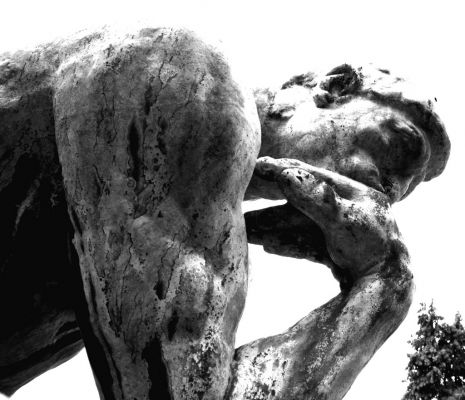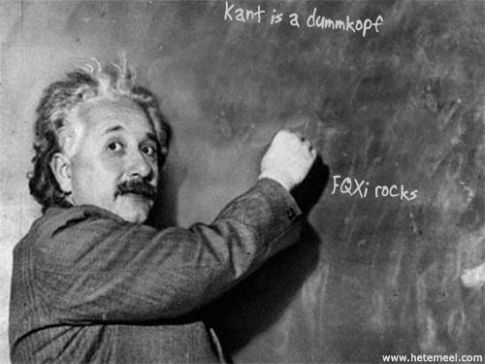
image: xJasonRogersx
It's not quite timeless, but Steven Weinberg's *Dreams of a Final Theory* is a classic of the popular science genre. In it, he notes that he was an enthusiastic student of philosophy as an undergraduate . . . that is, until "the insights of the philosophers I studied seemed murky and inconsequential compared to the dazzling successes of physics and mathematics."
At that point Weinberg turned away from the venerable path of Augustine and Aquinas, Hegel and Husserl, and began a lifetime pursuit in the physical sciences that would prove a glittering triumph. What with his Nobel-winning contribution to field theory that allowed for unification of the weak and electromagnetic forces - not to mention his winning of everything from the Oppenheimer Prize to the James Joyce Award -- it is difficult to conjure up any profound sense of disappointment at the career he chose to forego.
Actually, Weinberg did far more than leave philosophy behind; in *Dreams* he actively campaigns against it. An entire chapter is dedicated to exposing, with a wink to Wigner, the "unreasonable ineffectiveness of philosophy."
From *Against Philosophy*:
"From time to time since then I have tried to read current work on the philosophy of science. Some of it I found to be written in a jargon so impenetrable that I can only think that it aimed at impressing those who confound obscurity with profundity.
But I do not aim here to play the role of a philosopher, but rather that of a specimen, an unrenegate working scientist who finds no help in professional philosophy. I am not alone in this; I know of no one who has participated actively in the advance of physics in the postwar period whose research has been significantly helped by the work of philosophers. . . .
Physicists do of course carry around with them a working philosophy. For most of us, it is a rough-and-ready realism, a belief in the objective reality of the ingredients of our scientific theories. But this has been learned through the experience of scientific research and rarely from the teachings of philosophers."
Strong words, and conceivably a bitter pill for those among us--at FQXi, hardly a minority--who feel physics and philosophy may share areas of significant overlap (physics and religion, I should note, is a different claim). Or, at least, those who feel that physics is now in a position to begin to answer certain deep questions long relegated to the philosopher's café table.
Yet Weinberg is hardly the only great mind to take a dim view of the toga. Here's Richard Feynman:
"Philosophers, incidentally, say a great deal about what is absolutely necessary for science, and it is always, so far as one can see, rather naive and probably wrong. . . .
You can take every one of Spinoza's propositions and take the contrary propositions, and look at the world - and you can't tell which is right. Sure, people were awed because he had the courage to take on these great questions, but it doesn't do any good to have the courage if you can't get anywhere with the question."

image: hetemeel
Full disclosure: I am passionate about philosophy, teach courses on Existentialism and Literature, and routinely advocate to undergraduates that they be willing to take the question of the meaning of their lives seriously (against the tide of much modern philosophy, in fact, which emphasizes ironic distance; but leave that aside). Yet in the corner of the Agora where we speculate on the nature of physical reality, and how best to attain knowledge of same, dismissals such as Weinberg and Feynman's do hit a nerve. I remember in my own undergraduate days suffering mightily under the misapprehension that statements made in philosophy seminar were somehow "true" in the same way as those made in physics survey. Both referred to the world, thought I, so both must be describing aspects of the same thing. Thus I tried for a long time to understand how Kant's "insights" into space and time, laid out in all their impenetrable obliquity in *The Critique of Pure Reason*, could be put together with Einstein's.
It was only after a lot of fruitless effort that I came to recognize Transcendental Idealism and Special Relativity don't go together. (Disagreements with that statement are welcome.) That realization in itself was a frustration; but recognition of the reason behind my error was absolutely fruitful. Kant--I say this with due deliberation--didn't make any discoveries into the nature of space and time; he made assertions about them. (Hegel made quite other ones; Heidegger still others.) To be sure, the quality philosopher's positions are hardly guesswork; by rejecting Humean empiricism, Kant was building on a long line of philosophical tradition he and all his admirers regarded as credibly established beforehand, the whole train of Enlightenment epistemology. But the simple question remains: was he right?
Or, with Feynman, perhaps the more important question: Can we even tell?
I recognize that this is a bit of a straw-man argument I am building up here, but a productive one nonetheless. So far, every indication is that Einstein was absolutely right. Not "influential," not "challenging us to see things in a new way," - just right. We don't have to construct those odd sentences around him that we do around pure philosophers, such as "For Einstein, length measurements are relative to the observer's reference frame," or "In Einstein's view, gravity is the result of four-dimensional spacetime curvature." These aren't positions in Einstein's systematic philosophy of Being: they are something far more profound. They are true.
Limited in their scope, yes; still to be unified with QM, yes; all the standard caveats about scientific theory apply. But SR and GR make numerous specific predictions that have been, and are being, tested all the time. Two hundred years later, Kant remains influential, insightful, challenging--but was he right?
And if we can't answer that question--let's put the issue boldly--shall we cease burdening our thoughts with the verbal complexities of a tradition that may not actually be progressing at all, but only undergoing an outmoded, self-referential dance?
Are we really at the dawn of a new age of "Physics and Philosophy," as so many popular books and magazine articles suggest--or at the twilight of Philosophy altogether?

image: Johan J.Ingles-Le Nobel